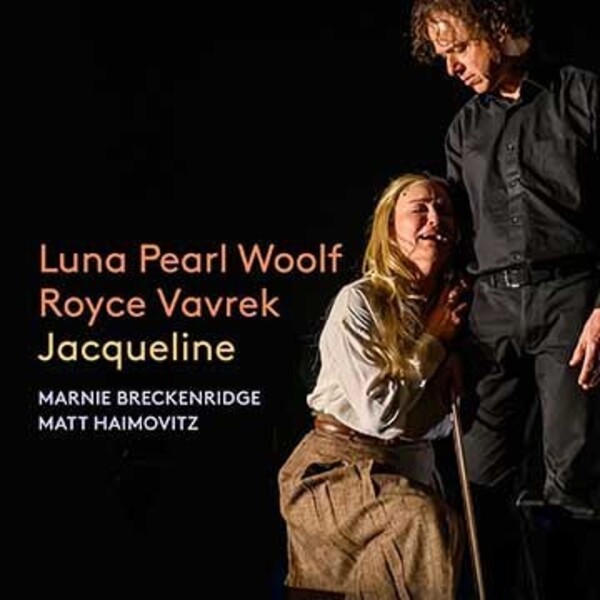WOOLF Jacqueline (Marnie Breckenridge)
View record and artist detailsRecord and Artist Details
Genre:
Opera
Label: Pentatone
Magazine Review Date: AW2024
Media Format: CD or Download
Media Runtime: 85
Mastering:
DDD
Catalogue Number: PTC5187 341

Tracks:
| Composition | Artist Credit |
|---|---|
| Jacqueline |
Luna Pearl Woolf, Composer
Marnie Breckenridge, Soprano Matt Haimovitz, Cello |
Author: David Patrick Stearns
Jacqueline du Pré – and her many posthumous admirers – need to be rescued from her legend. The 1998 film Hilary and Jackie prompted a revolt of sorts against the unsympathetic treatment of this beloved cellist, who was hit with multiple sclerosis at the age of 26 and then had an agonising decline ending in her 1987 death. The opera-of-sorts Jacqueline, a series of monologues and soliloquies by composer Luna Pearl Woolf and librettist Royce Vavrek, intentionally builds into a graphic nightmare. It’s also an ordeal. What is to be gained by it?
In real life, any disease like multiple sclerosis warrants immediate and unconditional sympathy. But that’s not what one experiences in this case, which dates back to decades when understanding and treatment of this cruel degeneration of the central nervous system barely existed. Dramatic intentions seem confusing from the start of this 85-minute monodrama, with du Pré represented by soprano Marnie Breckenridge, accompanied only by solo cellist Matt Haimovitz. Her first tragic utterance, ‘I have a disease’ (truly an understatement, since she had a particularly aggressive form of MS), is immediately followed by a puzzlingly casual ‘you know’ – all set to swooping, swooning vocal lines that could be outtakes from Schoenberg’s Pierrot lunaire.
Subsequently, in four hyperbolically titled sections – ‘Star Birth’, ‘Super Nova’, ‘Meteorite’ and ‘Impact’ that encompass 27 episodes – the vocal lines become a bit more tame but with words so elongated as to be robbed of any conversational contour or pathos. Greater emotional content is experienced in the cello-writing, which also tends towards atonality but at least has the dramatic density of a non-stop cadenza. What do make sense are the direct quotations from du Pré’s signature repertoire, such as the opening moments of Brahms’s Cello Sonata No 1 and, of course, Elgar’s Cello Concerto. However, the quotations are reminders of how unsatisfying Woolf’s music is, not just in comparison to these past masters but to her own work, such as the traditionally functional harmony she employed in her 2014 opera The Pillar about the investment robber Bernard Madoff.
Further complications in Jacqueline arise from the seemingly random chronology of the scenes. Going back and forth in time, the child Jackie charmingly struggles to get her arms around the cello, while the older Jackie has disagreements with recording producers over her highly personal interpretations. Her husband Daniel Barenboim is occasionally mentioned. Psychotherapy is in there. One movement consists of her telling a naughty joke with a long build-up and no punchline. She ridicules the well-wishers at her concerts – as well as her standard replies to them. There are some moments of simple profundity, though not when she tells her disease ‘fuck you’ – a worn-out epithet that has little impact these days. True to life or not, all of this adds up to a rather unattractive character.
Performances are extraordinary, though not always on target. Soprano Breckenridge miraculously maintains a pleasing tone and sense of lyricism in vocal lines that could easily reduce any singer to barking. Less fortunately, she affects a British accent that doesn’t ring true to these American ears, and constantly calls attention to itself rather than the meaning of the words. Haimovitz is one of the few cellists out there who could participate in a Jacqueline du Pré opera without being unfavourably compared to her. His playing is tireless, accurate and deeply artistic, though in some ways his mastery calls into question how relevant Woolf’s music is to the subject matter.
The premiere at Toronto’s Tapestry Opera had good reviews, which suggests that the piece is more effective when seen on stage. Still, I’d want to avoid such encounters: near the end of the opera, Jackie is described as follows: ‘Wearing an elegant concert gown, Jackie manoeuvres her body, crab-style.’ The sung words: ‘When much of your body turns against you, you will be pleased to know that your bum provides a perfectly fine means of transportation, particularly down the stairs.’ This is not a visual memory I ever want to have. And had anybody on this operatic team heard of stair-lift chairs that have been in domestic use since the 1920s?
The one positive outcome from hearing Jacqueline was returning to the beginning of the du Pré legend, her original studio recording of the Elgar Concerto. I hadn’t heard it in decades, preferring her later live recordings. But this earlier one re-captivated me, delivering highly personal interpretative ideas with an elegant veneer. Along with Glenn Gould’s Goldberg Variations (first recording) and Elisabeth Schwarzkopf’s Four Last Songs (second recording), du Pré’s Elgar is a singular musical monument that changes the way we listen.
Discover the world's largest classical music catalogue with Presto Music.

Gramophone Digital Club
- Digital Edition
- Digital Archive
- Reviews Database
- Full website access
From £8.75 / month
Subscribe
Gramophone Full Club
- Print Edition
- Digital Edition
- Digital Archive
- Reviews Database
- Full website access
From £11.00 / month
Subscribe
If you are a library, university or other organisation that would be interested in an institutional subscription to Gramophone please click here for further information.




